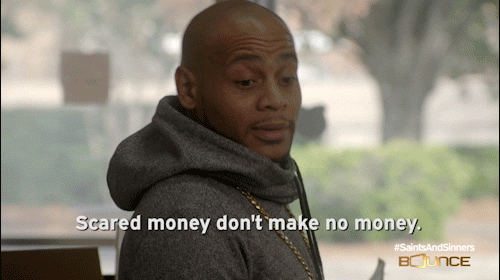I recently went to Miami for what seemed like it would be a pretty exciting adventure.
The plan was to drive around in a rented convertible with a new love interest and attend an inspiring, thought-provoking event that seemed to be right up my alley. All signs pointed towards a humdinger of a good time.
So, when I started packing for the trip why did I realize…I wasn’t excited? Easy.
Because if I allowed myself to get excited, I’d also be opening up the possibility to be disappointed.
Ah, yes of course.
Sound familiar? Anybody who’s experienced heartbreak, job interviews, or just a string of mediocre parties can probably relate.
For those who are new to being human, let me explain.
I used to be a pessimist.
My logic was flawless. As a pessimist, I believed that if everything failed, I’d be proven right, and if things went well, I’d be pleasantly surprised. Either way, I’d win.
Genius.
I mean we all know what comes with being one of those insufferable optimists...Disappointment. Maybe we even tried it when we were young and naive. Time and time again we’d walk in with a smile on our face and hope in our hearts and time and time again we’d be let down. Eventually the brightest of us would finally wise up and realize we’d rather be right about how the world sucked then be let down - again.
So we become pessimists.
We start to believe that life sucks and people do too. No one is looking out for us and love always dies. But don’t call us depressed, we prefer the term realists. You can’t disappoint us if we already expect the worst, right?
Sure, but there’s a problem.
Actually, a couple of them.
The Sexual Tension of Optimism
At the end of the day, pessimism is a self-protective mechanism against a world that feels unpredictable and unfair. I get it.
If you’re a pessimist, yes, you might be pleasantly surprised when you’re wrong and things go better than expected, but you end up missing out on the anticipation of things going well.
And that’s half the joy. Excitement is half the process of satisfaction.
Think about a song right before the beat drops. The tension is building, the crowd is simmering, everyone is waiting for the drop so they can melt into the release of the acoustic tension. Half of the joy in that process is the build up. It’s the expectation. It’s anticipating the good that is coming but knowing it’s not here yet. If you only live for the climax then you miss out on the thrill of the buildup.
This is what I realized before my trip to Miami.
As I packed my bags before the trip I realized that even if everything went well, I’d only get to experience half the joy that was available to me. I had to put on my optimistic undies and allow myself to anticipate satisfaction if I wanted the full experience. Yes, it made me susceptible to disappointment, but it also doubled my potential joy. I had to realize that the amount of fulfillment you experience is proportional to the amount of disappointment you are willing to risk.
Pessimists Aren’t Creative.
Not only is anticipation half of the recipe for satisfaction, the excitement is what motivates you to make it a good time. If you already don’t think a date is going to go well, you’re not going to put in the effort to make it a good time. Looking forward to a trip is what motivates you to obsessively research the town you’re headed to. It’s the anticipation that encourages you to throw in just one or two more fun activities into your itinerary. If you’re anticipating a mediocre trip, you won’t go the extra lengths to make it extraordinary. (And maybe that extra mile is exactly what ends up being the thing that makes it so satisfying in hindsight.)
That’s the problem. Pessimists can’t see possibility. You’re constantly anticipating danger which inevitably means you do your best to make your world smaller and safer - which is redundant because if you already believe the world is out to get you, it’ll always come to get you no matter how small of a world you make.
A pessimist sits in the restaurant at the end of a bad date and thinks, “Yep, you see. That’s why I should’ve stayed home. All the good ones are already taken.” Whereas an optimist can look around and see who else might be worth chatting up at the bar. Sure, they could end up with another disappointing conversation but between the optimist and the pessimist only one of them can one day start their wedding speech with the words, “So I had just finished the WORST date of my life and was about to head home when I turned around and saw… her.”
In the case of Miami, the rental car I was so excited about had a bunch of malfunctions and the event wasn’t as mind-blowing as I’d hoped - but it didn’t matter. It was the best trip I’d been on in a while - because I had already committed to it being so. Even when we got to the rental car and realized within seconds that it was a lemon, our excitement overrode our disappointment and we laughed it off. Even when we went to the event and found out it wasn’t going to be as revolutionary as we thought - the focus of the trip became the joy of being with each other rather than the fulfillment of prior expectations. “Look on the bright side!” might seem like a trite and tired cliché but it’s stuck around for a reason. Relentless optimism inevitably creates results. If there’s always a bright side, if there’s always possibility, why not seek it? Eventually something’s gotta give.
Here’s The Point.
Growth, hope, innovation - all of these are inherently optimistic endeavors.
Pessimists won’t try something because they already “know” it won’t work. So how could they be inventors?
Pessimists don’t treat their depression, they perpetuate it. So how could they be happy?
A pessimist won’t approach the person they’re attracted to. So how could they find love?
I mean if pessimists really believed that the world was doomed to fail, why would they have kids in the first place?
Look, disappointment is a great sign. It means you expect good things to happen. It means you have hope, and hope is what make us human. Even if it’s a little delusional - it’s inherently necessary.







